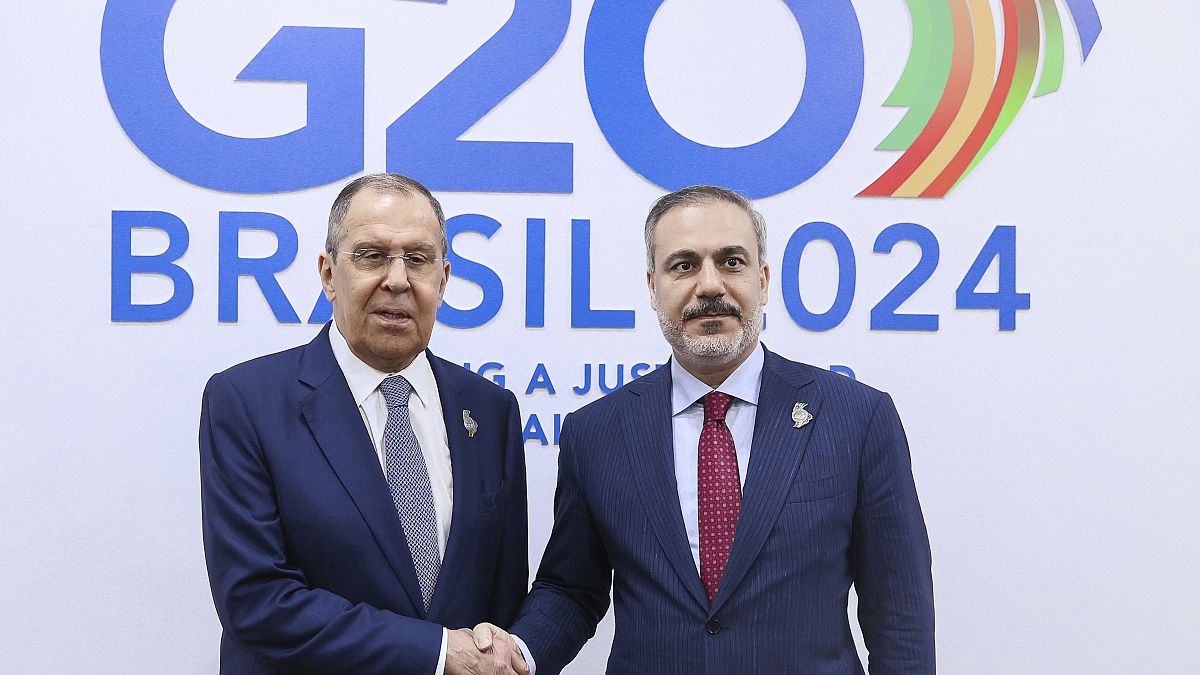
Russian Foreign Minister Sergei Lavrov has said he is “surprised” that Turkey is continuing to supply weapons to Ukraine while offering to act as mediator in the conflict.
NATO member Turkey has been trying to strike a balancing act between the two countries since Russia’s full-scale invasion of Ukraine in February 2022.
Ankara supports Ukraine’s territorial integrity and has provided the country with armed drones and other military support, but it is also strengthening its energy ties with Russia and opposes Western sanctions on Moscow.
Turkey hosted peace talks between the two nations shortly after the invasion in 2022, and Turkish President Recep Tayyip Erdoğan has repeatedly discussed brokering further discussions. Ukraine has since remained firm on not engaging directly with Russia on peace negotiations, and Russian President Vladimir Putin said last week that Kyiv had already twice rejected ceasefire initiatives from Moscow.
In an interview with the Turkish newspaper Hürriyet, Lavrov said: “Turkish weapons are used by the Ukrainian armed forces to kill Russian military personnel and civilians.”
“This situation cannot but cause surprise, given the Turkish government’s statements that it is ready to provide mediation,” he said in the interview published on Friday.
Turkey has supplied Ukraine with Bayraktar TB2 drones, heavy machine guns, laser-guided missiles, electronic warfare systems, armoured vehicles and protective gear.
The Turkish defence and aviation industry achieved record exports in 2023, which totalled $5.5 billion, up 27.1% on the previous year, according to a report by the Turkish Exporters Assembly (TIM). About 5.3% of those exports went to Ukraine, which was a similar share of exports to Azerbaijan (5.1%) and Poland (4.9%), but considerably less than the proportion that went to the US (16.7%), the report said.
Turkey’s tightrope
As part of the Military Framework Agreement between Turkey and Ukraine in October 2020, both countries agreed to the exchange of military intelligence, cooperation between the armed forces and defence industry, mutual education and training activities.
During Erdoğan’s visit to Kyiv on 4 February 2022 — before Russian’s full-scale invasion — the two countries signed a dozen other agreements, including a free trade deal.
Speaking to Euronews Turkish, IYI Party Ankara MP Kürşad Zorlu said: “Turkey has a comprehensive and future-oriented defence industry cooperation with Ukraine. It is also known that some inputs for the Turkish defence industry are supplied from Ukraine.”
“Turkey’s goal of ensuring the sustainability of this is understandable,” said Zorlu, who is a member of the Committee on Foreign Affairs of the Grand National Assembly of Turkey.
Nevertheless, Ankara is also seeking to improve ties with Moscow, and they have increased cooperation on trade, tourism and energy since Russia’s full-scale invasion.
In recent months, Turkey has expressed a desire to join the BRICS economic union. Named after original members Brazil, Russia, India, China and South Africa, it has this year expanded to include Egypt, Ethiopia, Iran, Saudi Arabia and United Arab Emirates.
Erdoğan met with Putin on the sidelines of a BRICS summit last month in the Russian city of Kazan. The Russian president said his Turkish counterpart had again put forward proposals on shipping in the Black Sea and establishing a grain corridor, while Erdoğan told reporters he wanted to start “peace negotiations between the two countries as soon as possible”.
Military observers say Russian forces have significantly intensified their advances in Ukraine since September, highlighting Russia’s huge advantage in manpower and arms, while Kyiv has been demanding more aid and weapons from its Western allies.





